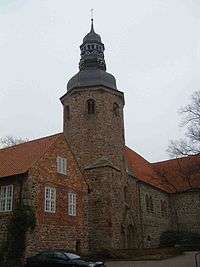Convention of Klosterzeven
The Convention of Klosterzeven (or the Convention of Kloster-Zeven – German: Konvention von Kloster Zeven) was a 1757 convention signed at Klosterzeven between France and the Electorate of Hanover during the Seven Years' War that led to Hanover's withdrawal from the war and partial occupation by French forces.[1] It came in the wake of the Battle of Hastenbeck in which Hanover had suffered a devastating defeat. Following the battle the Army of Observation had retreated northwards until it had reached Stade.
The agreement was deeply unpopular with Hanover's ally Prussia, whose western frontier was severely weakened by the agreement. After the Prussian victory at Rossbach on 5 Nov 1757, King George II was encouraged to disavow the treaty.[2] Under pressure from Frederick the Great and William Pitt, the convention was subsequently revoked and Hanover re-entered the war the following year.[3] The Duke of Cumberland who had signed the agreement on behalf of Hanover was disgraced when he returned to Britain ending his previously distinguished military career. He was replaced as commander by Duke Ferdinand of Brunswick.
See also
References
- ↑ Anderson p.211-12
- ↑ Duffy, Christopher. The Military Life of Frederick the Great, Antheneum, New York, 1986. p. 144 ISBN 0-689-11548-2
- ↑ Anderson p.215-16
Bibliography
- Anderson, Fred (2001). Crucible of War: The Seven Years' War and the Fate of Empire in British North America, 1754-1766. Faber and Faber.
- Charteris, Evan (1925). William Augustus, Duke of Cumberland and the seven years' war. London.
- Mediger, Walther (1984). Hastenbeck und Zeven. Der Eintritt Hannovers in den Siebenjährigen Kieg. Niedersächsisches Jahrbuch für Landesgeschichte (in German). 56. pp. 137–166.
- Szabo, Franz A. J. (2007). The Seven Years' War in Europe, 1756–1763. New York.
